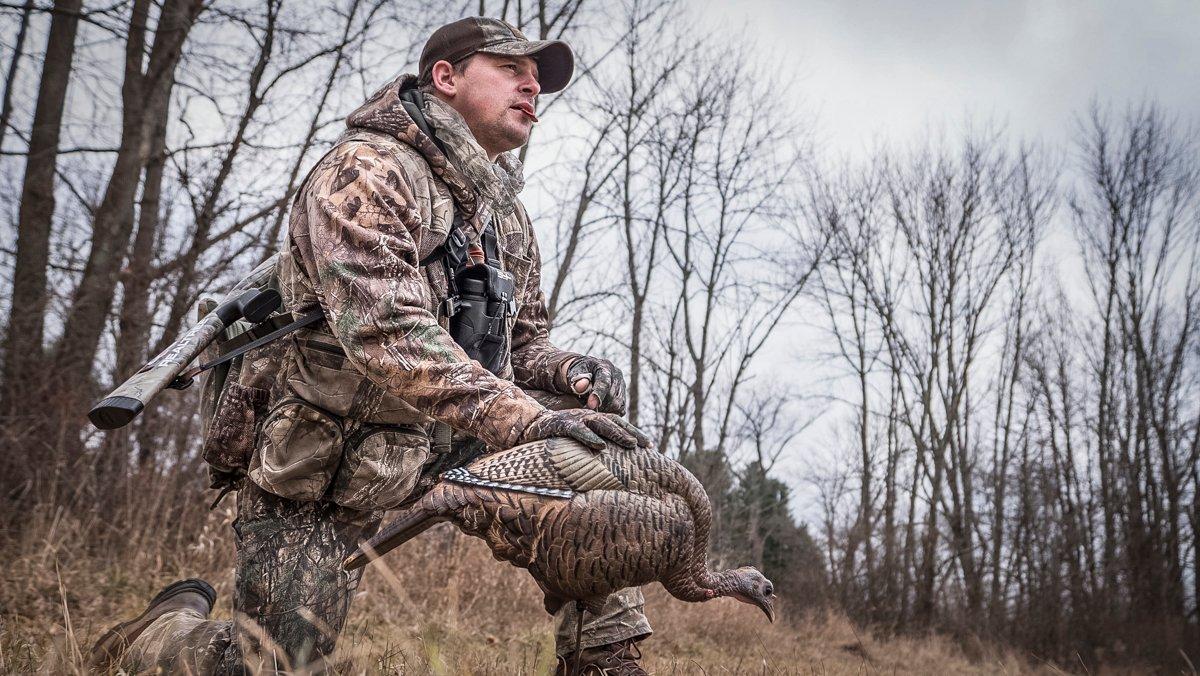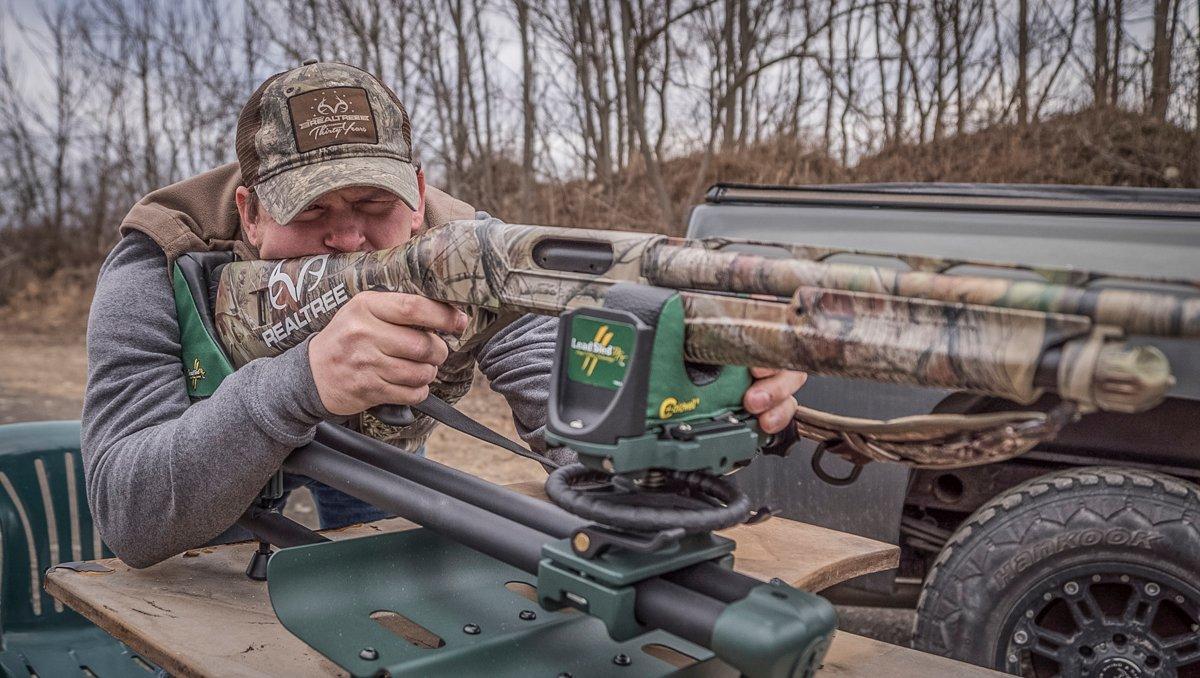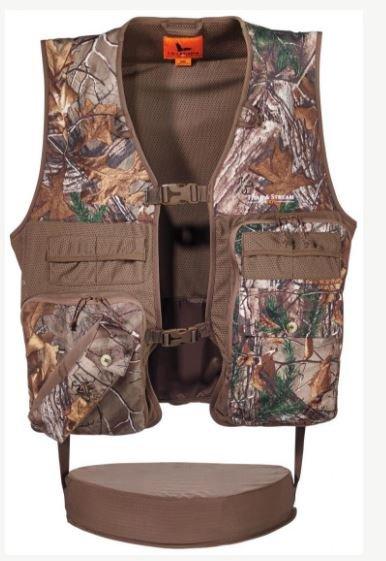Advice from Realtree Pro Staffer Anthony Virga
There are tried-and-true ways to assure you'll come home empty-handed from the turkey woods. They're easy. Just follow these steps as laid out by champion turkey caller and Realtree pro staffer Anthony Virga, who has seen them in action and learned some of them first-hand.
Mistake 1. Be Impatient.
Everybody says, 'patience kills' and it does, Virga said. I think I just figured it out and got a little more accustomed to patience in the last few years. He provided this scenario. Many times a tom will stop gobbling 100 yards out after he's been working in all morning or came quickly for the first couple hundred yards. Then he stops. Not that he's seen you, he just stopped. Smart birds, or birds that have been pressured by hunters, may do that, Virga said. Maybe you turned him off with too much calling, maybe he just lost interest. Whatever the case, you get antsy and decide to move in or try another spot. Do yourself a favor, Virga said, stay awhile. A lot of times all it takes is another 15, 20 minutes to wait him out, and he'll come in, he said.
Mistake 2. Leave in a Huff.
Another tip, related to No. 1, Virga said, is when it is time to leave - and I've seen a lot of guys on TV do this, even guys I've hunted with, they just stand up and take their mask off; they talk; sometimes they unload their gun or whatnot, making a ruckus. Big mistake, he said. Get out of there the same way you came in, he said. Get your stuff together quietly; walk out really slow. That way you can come back in a couple of hours and make another attempt to kill that turkey, but once you screw him up, it ruins your chance to hunt him later that day. I've scared a lot of birds over the years. We all have. There's a gobbler coming, then he stopped gobbling for 15 minutes and you can't take it anymore and the next thing you know, you have your facemask off and you're staring at a gobbler staring at you 30 yards away. And the next thing, he's gone. Get up slow and quiet. Pay attention.
Mistake 3. Be Highly Visible.
Turkeys have extremely good eyesight, Virga said. Most of the time, if you can see the turkey, the turkey can see you, he said. That's one of the most logical things you can go by. Many hunters, especially those new to the sport, will spot turkeys in a field and try to sneak through the woods to get to the field. If they spotted the turkeys, the turkeys have probably spotted, or are about to spot them, Virga said. Turkeys are always looking inside field edges, always looking in the timber, where danger in the form of coyotes or other predators, including hunters, may be lurking. They are always skirting 40, 50 yards from the field edge, Virga said. And that big boss hen is always looking inside the timber. Rethink your approach. Can you call them into the timber? Can you get ahead of where they seem to be going without being seen? And increase your chances by wearing Realtree camo matching your hunting area, head to toe, he said.
Mistake 4. Camp with the Turkeys.
I've done it, Virga said. I did it last year. A friend of mine got into filming and we were roosting turkeys the night before and had kind of an idea where they were. We got in early. I wanted in tight so we'd be set up for filming at first light, but we got in too tight and what I mean by 'too tight' is the turkeys were right above us. My buddy, Nick, looked at me like, 'what do we do?' and I said, 'Nothing. Just wait.' By then, there was nothing else we could do. It's where the patience factor comes in, he said. Get to a spot 100 yards, 75 yards away, whatever you are comfortable with, he said. People have their own idea what is too close. I'm known for getting as close as I can, but too close is a problem.
Mistake 5. Take Your Shotgun (or Archery Equipment) for Granted.
A lot of hunters don't pattern their shotguns enough or practice bow shots for real-world turkey-hunting conditions, Virga said. Today's choke tubes can produce deadly patterns at amazing distances, but you still need to know what your choke tube will do with your shotgun, with the shotshells you use, he said. And, don't just go by what you see on the Internet, he said. Just because a guy says he killed a turkey at an extreme distance with this choke tube in his shotgun doesn't mean it'll do the same in your shotgun, he said, and did he really kill it at 60 yards or whatever he's claiming? Virga patterns his shotgun, starting at 10 to 12 yards. Because sometimes we call them close and the pattern is tight, I'm talking like a golf ball. Then he shoots at 20, 30, and out to 50 yards. Some guys shoot out to 60, but I try to draw the line at 40, he said. Virga said he shoots a lot of different rounds, different chokes, 3-inch and 3½-inch. Hunters need to get to know their gun a little better. Same goes for bowhunters, he said. Same thing with archery equipment, whether you shoot a crossbow, longbow, compound, whatever, said Virga, who often bowhunts turkeys without a blind. It's a different ballgame shooting off your porch than sitting 10 yards from a gobbling turkey; especially if you have two turkeys rotating around your decoy. Your targets don't do that at home.
Mistake 6. Call Before You're Ready.
This is one Virga explains from experience. He and a buddy he hadn't hunted with for years were catching up on a Wyoming hunt, talking along the way, when they decided to call. A gobbler answered close by. We had stopped in the middle of a logging road, he said. There was nothing around us. We were stumbling around trying to find a spot. Turkeys can move pretty fast and this sucker did that. We were trying to find two trees and finally got masks on and the next thing we know the bird is gone. He caught us. Since then, Virga doesn't make a call until he's set up. Get yourself in a good position before you try to locate a bird or before you even touch a call, even a crow call, any kind of call. Then, if a bird gobbles, boom, you already have a plan, you're already set up.
Mistake 7. Catch Some Rays.
Setup position in general is important, Virga said. Get out of the sun, he said. Find a nice shady spot, in a position you can see turkeys approach. When you have time to do that, take full advantage of it. Take a few seconds and get set up in a good spot. He said he prefers the sun at his back, in the turkeys' eyes.
Mistake 8. Assume Turkeys Are There.
The turkeys you saw during deer season may not be there in the spring; and just because they aren't there, doesn't mean they're gone, Virga said. A lot of guys get confused, he said. They say, 'I swear turkeys were here a couple months ago.' Well, that doesn't mean they'll be there in the spring. Maybe there's a farmer tilling fields 2 miles away. They're probably over there looking for bugs. Birds in winter do different things than birds in spring, he said. They're not gone, they've just moved, he said. Scout. Get out and find them.
Field & Stream Men's Every Hunt Turkey Vest in Realtree Xtra
Mistake 9. Don't Stock Up.
Virga often hunts with others, including guiding disabled veterans for Hunters Helping Heroes hunts. It's remarkable, he said, how often people don't have easily forgettable essentials, like a facemask or camo gloves. Virga anticipates this, and carries extra sets in his vest. I'm always throwing them out to people, he said. I'm like a walking sporting-goods store. It's so important. It can save a whole hunt.
Mistake 10. Just Go.
It seems fewer and fewer hunters take the time to prepare themselves, Virga said. I know times are tough and everything is expensive and everyone's busy, he said, but preparation can make a big difference. I figure the more you prepare yourself, the more successful you can be, he said. There are a lot of categories of preparation, he said. Prep your calls, make sure they are in good condition; pick calls you can run, that you are comfortable with. Get your vest out, your boots, hats, mask, shooting gear; get everything together. Get decoys ready. Educate yourself as much as you can. Be open to learning. Every day hunting I learn something new, he said.
Dad always told me you gotta earn it, Virga said. You gotta earn things in life. It's the same way when you hunt. You gotta earn that turkey, deer or whatever. You gotta really prepare.
Go here for more Realtree turkey hunting. Follow us on Facebook.









